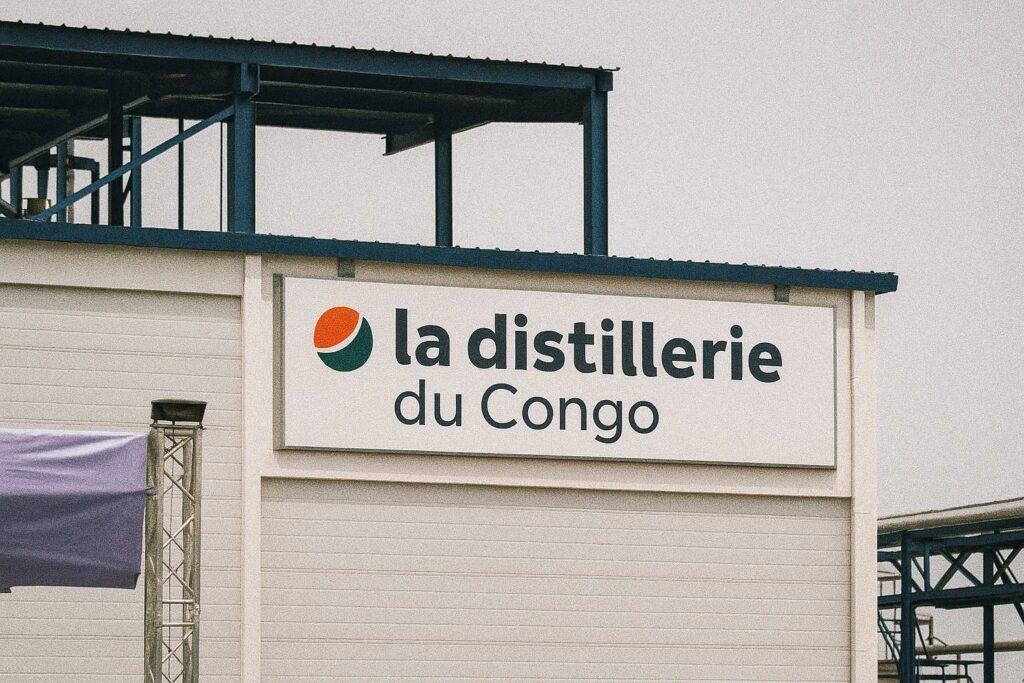Industrial Ambition Returns to the Niari Valley
The inauguration of the Nkayi ethanol distillery on 27 June 2025 marks the re-emergence of the Niari Valley as an industrial hub after decades of partial dormancy. Once compared to Germany’s Ruhr during the First Republic, the region’s productive fabric had been eroded by shifting commodity cycles and the structural adjustments of the 1990s. The present facility, developed by Somdia, the agro-industrial arm of France’s Castel Group, offers a tangible sign of renewed confidence in Congo-Brazzaville’s manufacturing base. Its daily capacity of fifty cubic metres—equivalent to more than six million litres of anhydrous ethanol annually—comfortably surpasses the nation’s current demand, according to data from the Ministry of Industry.
Strategic Partnership with Castel Group
At a declared investment cost of CFA 14 billion, the project is the latest deliverable under the public-private partnership framework championed by the government to crowd in foreign capital while retaining domestic value creation. Castel Group’s decision to anchor the distillery to SARIS Congo’s existing sugar complex ensures a reliable feedstock of molasses, reduces logistical costs and mitigates exchange-rate exposure on imported inputs (Jeune Afrique, 11 July 2025). The synergy mirrors trends in Brazil and India, where sugar-ethanol co-location has proven resilient against commodity price swings.
Macroeconomic Implications for Energy Security
Ethanol is increasingly viewed in Brazzaville as a strategic asset rather than a mere by-product of sugar refinement. By replacing the 5.5 million litres of alcohol previously imported each year, the plant is expected to save roughly USD 6 million in foreign exchange, a non-negligible figure for a country still navigating post-pandemic fiscal consolidation (African Development Bank, Country Brief 2024). Furthermore, blending prospects with gasoline—should regulatory standards align with the African Refiners and Distributors Association roadmap—could marginally ease pressure on refined-fuel imports and contribute to carbon-intensity targets pledged under Congo’s Nationally Determined Contribution.
Local Socio-Economic Spillovers and Agricultural Revitalisation
The distillery’s commissioning reverberates beyond macro-economics. SARIS Congo currently cultivates sugarcane over 12,000 hectares, but the company has announced exploratory plans to extend contract farming schemes to an additional 3,000 hectares managed by smallholders. If implemented, such out-grower models could stabilise rural incomes, disseminate agronomic best practices and stem rural-urban migration. Nkayi mayoral officials estimate direct employment at 250 skilled and semi-skilled positions, with an ancillary multiplier in transport, maintenance and services potentially doubling that figure over the next two seasons.
Regional Geopolitics of Biofuels in Central Africa
Nkayi’s ethanol output positions Congo-Brazzaville as a prospective supplier to land-linked neighbours such as the Central African Republic and Chad, both of which rely on costly imports routed through Cameroon’s ports. While cross-border regulatory harmonisation remains embryonic, the Central African Economic and Monetary Community has launched a technical task-force on biofuel standards, an initiative welcomed by Brazzaville diplomats during the April 2025 Libreville summit. Analysts from the Institute for Security Studies note that biofuel cooperation could bolster regional energy interdependence and thereby reinforce collective bargaining power on climate finance.
Balancing Public Health and Industrial Growth
Public-health advocates have nevertheless called for stringent monitoring to ensure industrial alcohol is not diverted into informal potable markets. The Ministry of Health has pre-emptively announced a traceability mechanism based on denaturing additives and digital batch tracking, an approach piloted in Rwanda with favourable results. International experience suggests that economic diversification and public-health protection need not be mutually exclusive, provided enforcement is robust and community awareness campaigns are sustained (World Health Organization, Policy Brief 2023).
Long-Term Outlook for Congo’s Diversification Agenda
The Nkayi facility aligns with the National Development Plan 2022-2026, which identifies agro-industry, energy transition and import substitution as pillars of a post-hydrocarbon economy. While the scale of the investment is modest relative to the country’s oil sector, its catalytic significance lies in restoring investor confidence and showcasing the feasibility of vertically integrated value chains. As President Denis Sassou Nguesso remarked during the inaugural address, ‘industrial sovereignty begins with transforming our own raw materials’. Whether the distillery becomes a stand-alone success or the first node in a broader bio-economy will depend on sustained policy coherence, infrastructure upgrades and regional market integration. For now, Nkayi’s sweet scent of molasses offers a pragmatic reminder that diversification is often distilled one batch at a time.

